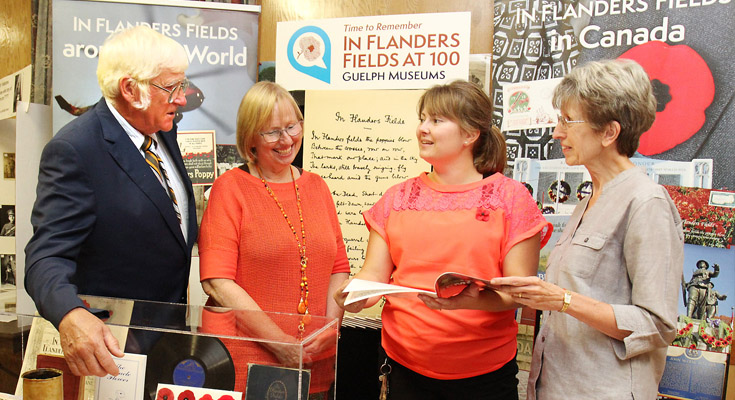Submitted by admin on

Photo, from the left: McCrae descendant Don Campbell with Guelph Museum Curator Bev Dietrich; In Flanders Fields Commemoration Coordinator Jessica Gibson; and Historical Society member Sherrill Calder.
from the Tavistock Gazette, September 23, 2015
In Flanders Fields: The Story of John McCrae, a travelling road show, was in Tavistock last week as the second in a 5-part series commemorating the 100th Anniversary of World War I.
Bev Dietrich, Curator of the John McCrae House in Guelph, Ontario gave the feature address while Jessica Gibson, In Flanders Fields, Commemoration Coordinator for the Guelph Museums, displayed the works of John McCrae amd handed out coins and books on his life.
More than thirty people attended the evening presentation at the Tavistock Legion Hall hosted by the Tavistock and District Historical Society.
Sherrill Calder introduced the speaker saying it was 100 years since the poem was written, the third time Ms. Dietrich has been a guest in Tavistock; the second event in the series, and the first time there has been a travelling road show.
Although most adults can recite In Flanders Fields by memory, very few know much about the man who wrote it.
Lt. Col. John McCrae was born in Guelph in 1872 and was a soldier in both the Boer War and World War I.
He grew up living on Water Street, beside the Speed River, and at an early age was active in the Highland Cadets. At age 16 he earned a scholarship to the University of Toronto and along wit his studies, was a member of the Varsity Rugby Team, Glee Club, and Drama Club.
In 1898 he completed his medical schooling at the top of his class and took an internship at Johns Hopkins Hospital in Baltimore, Maryland.
In 1900 he volunteered to fight in the Boer War in South Africa, commanding an artillery unit. During this time he was writing and sketching and one piece of art shows the troop ship, “Laurentian”, which he nicknamed the “rolly polly”. Everyone on board was seasick except himself and four others. He took care of horses on board during the journey and later wrote about ethical and proper treatment of animals on sea voyages.
In 1910 he volunteered as the medical officer for a one month canoe trip with Lord Earl Grey along the Hudson‘s Bay route.
Finally, in 1914, at the age of 41, he volunteered to serve in World War I as a medical officer with an artillery unit. He was at the Battle of Ypres where he witnessed the results of poison gas attacks at his Essex Field Dressing Station. Two of his best friends were killed during the battle and the next day he wrote the first draft of In Flanders Fields.
The poem was published in Punch magazine, December 8, 1915, and it touched a public cord. It was then circulated and recited, set to music, and lines were used on posters to help with the war effort.
Living with chronic asthma since he was a child, Lt. Col. John McCrae was later assigned to the No. 3 Canadian General Hospital in charge of medicine. He settled in Boulogne, France. In one of his last letters to his mother, and after seeing the horrors of war, he wrote, “It doesn’t seem fair to rest.” As a result, his health failed and he died of pneumonia on January 28, 1918 only days after being promoted to consulting physician to the First British Army.
He was buried at Nimereaux, France with full military honours. Generals attended his funeral along with one hundred nurses who stood in caps and veils. His horse Bonfire led the procession with Lt. Col. McCrae’s boots backward in the stirrups.
After the war, the poppy became the symbol of remembrance in Canada and around the world as a direct result of Lt. Col. John McCrae’s poem.
Here in Canada, tributes and memorials were set up at his former high school and church, the University of Toronto, McGill, and at the Canadian War Museum in Ottawa. There have been postage stamps, coins and paper bills with the poem incorporated.
A plaque was placed on his birthplace home in 1946, while it was still a private residence. It was purchased by 3 forward-thinking Guelph families in 1966 for $15,900 and in 1983 acquired by the City of Guelph to become a National Historic Site.
The McCrae House was refurbished and reopened in May of this year to host a year-long exhibit for the 100th anniversary of the poem. A memorial gardens is attached to the home. Recently a replica of the statue of McCrae unveiled in Ottawa was placed in front of the Guelph Civic Museum. The larger-than-life bronze was done by Wellesley sculptor Ruth Abernethy.
Following the address, grand nephew Don Campbell spoke to the crowd about some of the little known connections between John and his brother, Dr. Tom McCrae. Tom was instrumental in helping to write a book of medicine that is used by physicians to this day. He also touched on the connection between McCrae and Canadian literary people such as Leacock, MacPhail, and MacDonald. There are 28 other poems attributed to McCrae, collected in 1919.
The WWI display exhibit at the Tavistock Legion continued the rest of the week with the Tavistock Men’s Club visiting Thursday night, six local Women’s Institutes on Friday, and the public welcomed Saturday and Sunday. The Ted Cominsky orchestra from Ingersoll favoured visitors with music from the war era during a Sunday afternoon concert.
- 30 -